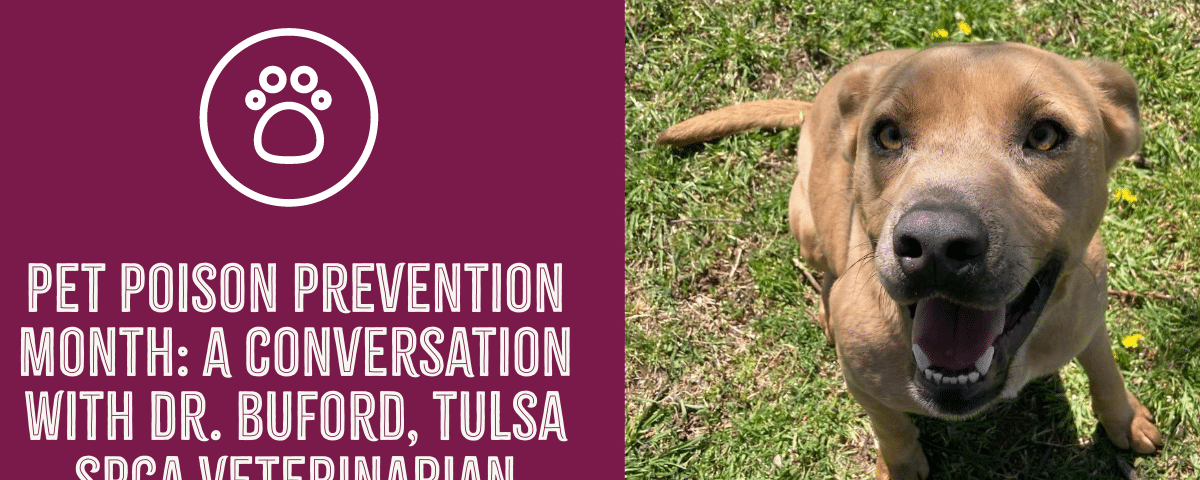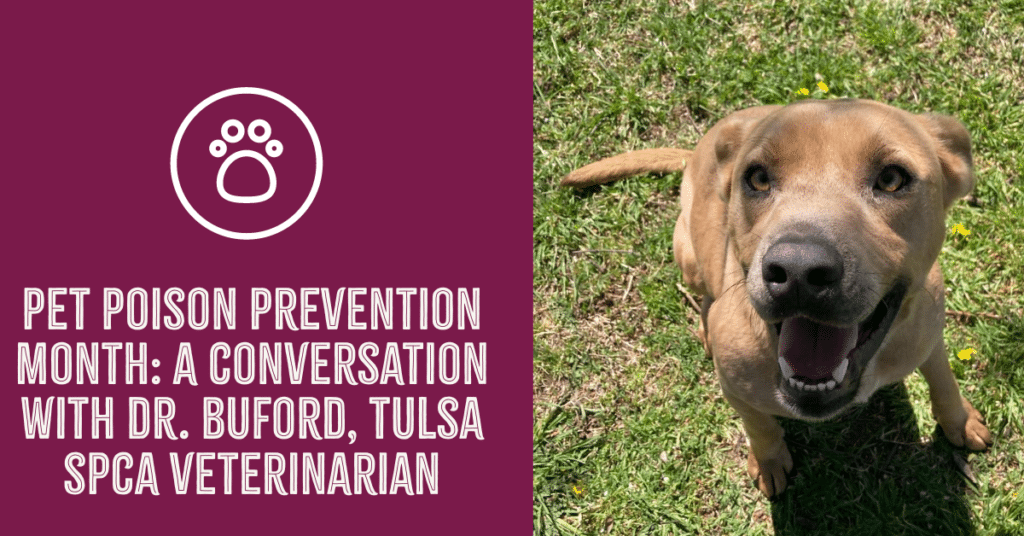
Dog Training 101: A Conversation With Mary Green
January 30, 2024
Pets Are Love: A Therapy Dog Program for Tulsa
April 30, 2024
Below is an excerpt from a conversation between Dr. Buford, Tulsa SPCA Veterinarian, and Kyle Paddock, Tulsa SPCA Director of Marketing and Communications
Kyle: As you know, March is Pet Poison Prevention Month. In preparing for our conversation, the first thing I wanted to ask you is how common is this problem in your experience?
Dr. Buford: It can be quite common. A lot of people don’t realize certain things are toxic. It’s vital to take stock of what is around your house that could be toxic to your pets. It really is super easy for a nosy dog or cat to get into something they shouldn’t right under our noses these days.
Kyle: I can imagine! Can you give our readers some examples of some substances they may not realize are toxic?
Dr. Buford: This time of year since Easter is right around the corner, a lot of people buy lilies. Lilies are actually toxic, and sometimes fatal, for cats if it is not handled right away. This is especially common as people plant lilies in their gardens or if they receive a flower basket around Easter that contains them—it’s so easy to let your guard down. Other things people may not know of are grapes and raisins! These foods, though delicious and perfectly safe for human consumption, can be toxic to dogs. Interestingly, it is not known precisely what component of grapes and raisins is toxic in dogs, so some dogs after ingesting will be fine while others could experience symptoms that could put them on death’s door with renal failure. So, it’s like Russian roulette, you never know and it varies dog to dog. Because of this, it’s important to call your primary care veterinarian (like Tulsa SPCA) or an emergency veterinarian ASAP. There are also a couple of animal poison control lines—the ASPCA is probably the most common one—that you can call in a pinch to determine if a substance is toxic or to get advice if you think your pet ingested something poisonous at 3 AM. (Please note ASPCA and Tulsa SPCA are not related, despite the similar names).
Kyle: I think my parents had one of those magnets on their refrigerator as I recall.
Dr. Buford: Yes, I’ve seen plenty of them, and some people save the number in their phone’s contacts. Another great reason to call a Poison Control Center like ASPCA is because it saves time when going to the vet! The typical questions you will be asked at the vet like how much of x did your dog eat, what time, what brand, etc.. will also be asked by the Poison Control people. They will then either email a copy of this data to the veterinarian’s office of your choice or to you personally for you to bring. That way you are less likely to forget crucial information that could be the difference between life and death for your baby.
Kyle: Wow, that’s brilliant! I never realized these national centers could be so useful. Is there a fee associated with calling in?
Dr. Buford: Typically yes, though it is minimal compared to the larger bill you might receive from a veterinarian if you did not have the accurate information I mentioned before and they needed to perform many additional procedures or even hospitalization.
Kyle: Wow, I will definitely keep this in mind and be more vigilant at home. Our two dogs love to get into anything they can. You mentioned previously that instances of accidental poisoning are relatively common. Can you give us an estimate based on your experience?
Dr. Buford: It’s difficult to give an estimate, but I can say certain times of year see this more than others. Early spring is quite common due to what I mentioned before but also Easter candy. Most people know chocolate is toxic to dogs, but many don’t realize certain types of chocolate are worse than others. For example, milk chocolate is less toxic than baker’s chocolate. You could have anything from vomiting to seizures depending on the amount ingested and the type of chocolate. It has to do with the amount of caffeine and certain other elements that humans can tolerate and enjoy, but dogs cannot.
Kyle: That makes complete sense. I also have been thinking about other things around the house like cleaning chemicals. I think most of us try our best to always store these items away from reach of our children or pets, but it’s easy to forget. Do you think poisoning cases happen more when items are left out and easily accessible, or is it just as common for pets to get into cabinets where we assume they are out of reach?
Dr. Buford: All of the above. I remember a case when a gentleman left a case of rat poison open in his garage and forgot it was there and then let his dog out. But if your pets are persistent enough, they will get into things. If your pet is like this, it might make sense to put dangerous chemicals in either a locked cabinet or in a room where they never have access to avoid potential accidents.
Kyle: Regarding the treatment, what do symptoms of poisoning look like and what are common treatments?
Dr. Buford: Most symptoms are vomiting and diarrhea, but if the toxin is more serious, we could see organ failure, extensive bleeding, seizures, and other more serious symptoms. It also depends on the amount ingested—symptoms are often more mild when they ingest a smaller amount of lesser serious toxins like houseplants.
Kyle: In this case, how does a person differentiate vomiting or diarrhea from something minor like a stomach bug? I don’t think most people would assume their pet has ingested a toxin if all they see are minor symptoms, or am I off base?
Dr. Buford: Not at all. That’s why I always tell people to be mindful of what your pet could have gotten into around the time they notice these symptoms. If they are unsure, it’s always best to bring them to their primary or emergency veterinarian. Even if it is a false alarm, it will be much easier on the pocketbook and most importantly, it could save your pet’s life.
Kyle: Thank you, Dr. Buford, for sitting down with me today and talking about this important topic!
Dr. Buford: My pleasure, Kyle!
**The ASPCA Poison Control can be reached at 1-888-426-4435. If you have any further questions on this topic, please don’t hesitate to call Tulsa SPCA at 918-428-7722. We are happy to help in any way we can!


